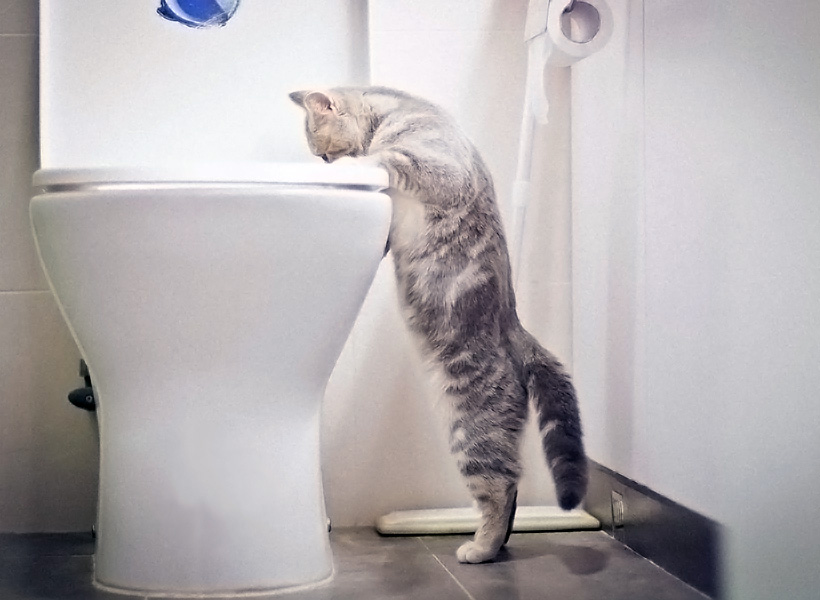Potential Issues of Flushing Cat Poop Down Your Toilet - Safeguard Your Plumbing
Potential Issues of Flushing Cat Poop Down Your Toilet - Safeguard Your Plumbing
Blog Article
Right here in the next paragraph you will discover a lot of high-quality help and advice concerning How to Dispose of Cat Poop and Litter Without Plastic Bags.

Intro
As cat owners, it's vital to be mindful of exactly how we dispose of our feline pals' waste. While it might seem convenient to purge pet cat poop down the commode, this practice can have harmful repercussions for both the setting and human health.
Alternatives to Flushing
Thankfully, there are much safer and a lot more liable ways to deal with feline poop. Think about the complying with choices:
1. Scoop and Dispose in Trash
One of the most common method of getting rid of feline poop is to scoop it right into an eco-friendly bag and toss it in the garbage. Make certain to make use of a committed clutter scoop and throw away the waste promptly.
2. Use Biodegradable Litter
Choose naturally degradable cat litter made from products such as corn or wheat. These clutters are eco-friendly and can be securely taken care of in the garbage.
3. Hide in the Yard
If you have a lawn, consider burying pet cat waste in an assigned area far from veggie gardens and water resources. Make sure to dig deep sufficient to prevent contamination of groundwater.
4. Mount a Pet Waste Disposal System
Purchase a pet garbage disposal system particularly developed for cat waste. These systems make use of enzymes to break down the waste, minimizing smell and environmental impact.
Wellness Risks
In addition to ecological problems, purging cat waste can additionally position health and wellness dangers to humans. Feline feces may contain Toxoplasma gondii, a bloodsucker that can trigger toxoplasmosis-- a potentially serious ailment, particularly for expectant women and individuals with weakened body immune systems.
Ecological Impact
Flushing feline poop presents damaging virus and bloodsuckers into the water system, posturing a substantial risk to marine environments. These pollutants can adversely influence marine life and compromise water quality.
Final thought
Accountable family pet ownership prolongs past supplying food and shelter-- it likewise includes appropriate waste administration. By avoiding flushing feline poop down the toilet and choosing alternate disposal techniques, we can minimize our environmental impact and shield human wellness.
Why Can’t I Flush Cat Poop?
It Spreads a Parasite
Cats are frequently infected with a parasite called toxoplasma gondii. The parasite causes an infection called toxoplasmosis. It is usually harmless to cats. The parasite only uses cat poop as a host for its eggs. Otherwise, the cat’s immune system usually keeps the infection at low enough levels to maintain its own health. But it does not stop the develop of eggs. These eggs are tiny and surprisingly tough. They may survive for a year before they begin to grow. But that’s the problem.
Our wastewater system is not designed to deal with toxoplasmosis eggs. Instead, most eggs will flush from your toilet into sewers and wastewater management plants. After the sewage is treated for many other harmful things in it, it is typically released into local rivers, lakes, or oceans. Here, the toxoplasmosis eggs can find new hosts, including starfish, crabs, otters, and many other wildlife. For many, this is a significant risk to their health. Toxoplasmosis can also end up infecting water sources that are important for agriculture, which means our deer, pigs, and sheep can get infected too.
Is There Risk to Humans?
There can be a risk to human life from flushing cat poop down the toilet. If you do so, the parasites from your cat’s poop can end up in shellfish, game animals, or livestock. If this meat is then served raw or undercooked, the people who eat it can get sick.
In fact, according to the CDC, 40 million people in the United States are infected with toxoplasma gondii. They get it from exposure to infected seafood, or from some kind of cat poop contamination, like drinking from a stream that is contaminated or touching anything that has come into contact with cat poop. That includes just cleaning a cat litter box.
Most people who get infected with these parasites will not develop any symptoms. However, for pregnant women or for those with compromised immune systems, the parasite can cause severe health problems.
How to Handle Cat Poop
The best way to handle cat poop is actually to clean the box more often. The eggs that the parasite sheds will not become active until one to five days after the cat poops. That means that if you clean daily, you’re much less likely to come into direct contact with infectious eggs.
That said, always dispose of cat poop in the garbage and not down the toilet. Wash your hands before and after you clean the litter box, and bring the bag of poop right outside to your garbage bins.
https://trenchlesssolutionsusa.com/why-cant-i-flush-cat-poop/

We had been shown that article on How to Dispose of Cat Poop and Litter Without Plastic Bags from a good friend on another web page. For those who enjoyed our blog post please be sure to pass it around. Thanks a lot for your time. Kindly come visit our site back soon.
Schedule Service Pickup Report this page